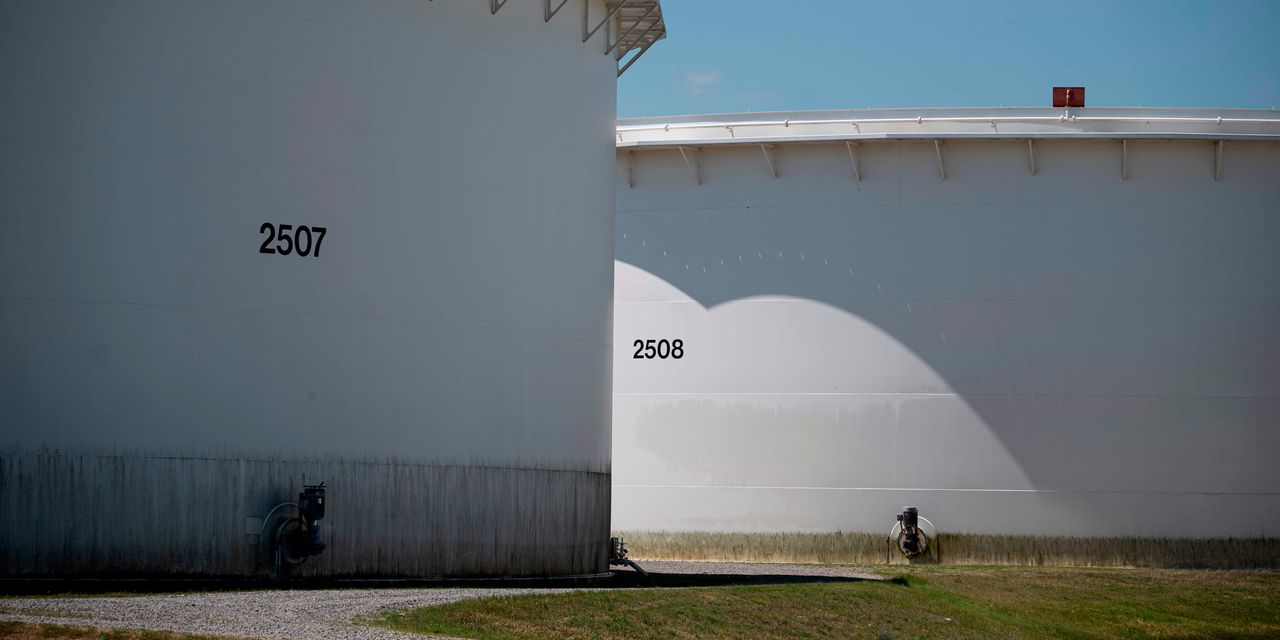Oil futures ended sharply lower Thursday, feeling pressure after a flurry of central bank interest rate hikes, including larger-than-expected increases by the Bank of England and Norway’s central bank.
Price action
-
West Texas Intermediate crude for August delivery
CL00,
-0.01% CL.1,
-0.01% CLQ23,
-0.01%
fell $3.02, or 4.2%, to close at $69.51 a barrel on the New York Mercantile Exchange. -
August Brent crude
BRN00,
+0.73% BRNQ23,
+0.80% ,
the global benchmark, settled at $74.14 a barrel, down $2.98, or 3.9%, on ICE Futures Europe. -
Back on Nymex, July gasoline
RBN23,
-0.66%
dropped 2.8% to $2.55 a gallon, while July heating oil
HON23,
-1.85%
declined 3.9% to $2.466 a gallon. -
July natural gas
NGN23,
+4.72%
rose 0.4% to finish at $2.608 per million British thermal units.
Market drivers
The Bank of England lifted its key rate by 50 basis points, or half a percentage point, a larger-than-expected move. Most economists expected a quarter-point move from the Bank of England.
The BoE move followed a half-point hike earlier Thursday from Norway’s central bank, which warned that a further hike may be needed in the near term. The Swiss National Bank also hiked interest rates on Thursday.
Meanwhile, Federal Reserve Chair Jerome Powell, in testimony before the Senate Banking Committee, repeated that a “strong majority” of policy makers expect the central bank to deliver two more quarter percentage point rate increases after leaving the fed-funds rate last week. Powell delivered a similar message on Wednesday before a House panel.
“With central banks increasingly intent on pushing down on inflation, even if it means forcing a recession, oil prices have reacted accordingly, sliding sharply from yesterday’s 1-week highs.,” said Michael Hewson, chief market analyst at CMC Markets U.K., in a note.
“Bigger then expected rate hikes from the Bank of England and Norges Bank and a Federal Reserve that has continued to push hawkish guidance is weighing on demand expectations,” he wrote.
The U.S. Energy Information Administration on Thursday reported a 3.8 million barrel drop in U.S. crude inventories last week, while gasoline stocks rose 500,000 barrels and distillates increased 400,000 barrels. Analysts surveyed by S&P Global Commodity Insights had, on average, expected crude stocks to show a decline of 2 million barrels, while gasoline stocks were expected fall 1 million barrels, with distillates seen unchanged.
“A rebound in crude exports, dip in imports, and ongoing strength in refining activity have encouraged a draw to crude inventories. Offsetting this modestly supportive print has been minor builds to the products,” said Matt Smith, lead oil analyst for the Americas at Kplr, in an email.
The American Petroleum Institute late Wednesday reported crude inventories fell 1.2 million barrels last week, according to a source citing the data, while gasoline stocks rose 2.9 million barrels and distillates fell 300,000 barrels.
Read the full article here



